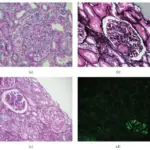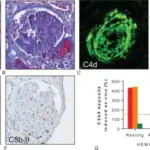Atheroembolic renal disease is a renal condition that occurs after a piece of plaque from the large arteries breaks off, travels, and blocking small arteries such as the renal arteries
What is the Pathology of Atheroembolic Renal Disease?
The pathology of atheroembolic renal disease is:
-Etiology: The cause of atheroembolic renal disease is atherosclerotic vascular disease
-Genes involved: Unknown.
-Pathogenesis: The sequence of events that lead to atheroembolic renal disease result after a piece of plaque from the large arteries breaks off, travels, and blocks small arteries such as the renal arteries. Emboli typically lodge in the arcuate and interlobar arteries.
-Morphology: The morphology associated with atheroembolic renal disease shows obliteration of blood vessels.
-Histology: The histology associated with atheroembolic renal disease shows lengthened biconvex transparent needle-shaped clefts.
How does Atheroembolic Renal Disease Present?
Patients with atheroembolic renal disease typically common in males present at the age range of old age. The symptoms, features, and clinical findings associated with atheroembolic renal disease include proteinuria, hematuria, accelerated hypertension, and acute renal failure.
How is Atheroembolic Renal Disease Diagnosed?
Atheroembolic renal disease is diagnosed through imaging- duplex doppler ultrasound, CT angiogram, MRI, catheter angiogram of the kidney.
How is Atheroembolic Renal Disease Treated?
Atheroembolic renal disease is treated by symptomatic and supportive management and dialysis.
What is the Prognosis of Atheroembolic Renal Disease?
The prognosis of atheroembolic renal disease is poorly linked with permanent organ damage.



